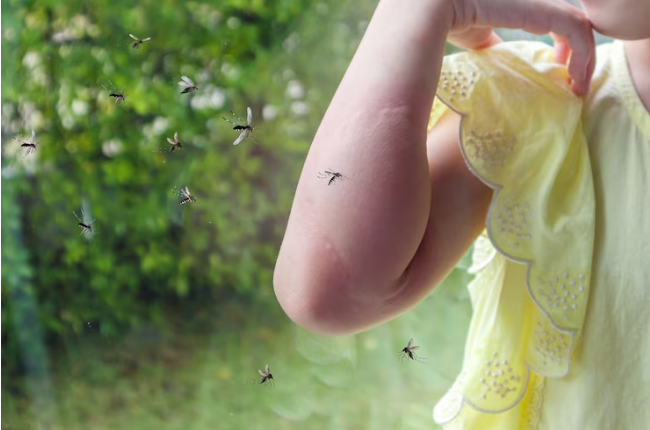Researchers Stacy Rodriguez and Immo Hansen discovered that people try a variety of home treatments for warding off mosquitoes, from taking iron tablets and sipping gin and tonic to hanging Ziploc bags filled with water and pennies.
These are only a few of the inventive, mainly untested mosquito-repellent methods that the researchers from New Mexico State University and their group assembled in a recent study that was published in the peer-reviewed journal PeerJ. deeper than 5,000 people from all around the world participated in the study’s online poll, which included a long list of unusual techniques that, according to the researchers, merit deeper investigation into their efficacy. (The list includes burning things like animal dung and vanilla candles, eating things like brewer’s yeast and aloe vera, and spraying things like beer mixed with mouthwash, Epsom salt, and boric acid or sucrose.)
However, even some of the more common and traditional insect repellents seen on store shelves don’t function any better than doing nothing at all, as Rodriguez and Hansen observed in earlier experiments. The researchers have examined a range of commercial goods, including citronella candles, vitamin B-containing skin patches, wearable technology, and essential oil sprays. Many of these offered little to no protection against mosquito bites, but they discovered that those containing DEET and oil of lemon eucalyptus were the most efficient.
According to Rodriguez, laboratory manager at the Molecular Vector Physiology Lab at New Mexico State University, “There are a lot of products out there that advertise [they] protect you from mosquitoes, but you as a consumer should be a little bit more proactive and look for active ingredients that actually work.”
According to Hansen, an associate professor of biology, mosquitoes are drawn to both the carbon dioxide we exhale and the chemicals produced when skin bacteria break down components of our perspiration. According to him, certain persons are more alluring to mosquitoes than others due to their unique bacterial composition and metabolism.
He continues that the insects have odor receptors and that their sense of smell is highly sophisticated. Consequently, several methods of deterring them, such consuming garlic, are ineffective. You won’t repel insects, but you will repel other people, claims Hansen.
However, he explains that DEET attaches to particular odor receptors in mosquitoes and overactivates them.
“Blocking them fully is harmful, but so is activating them too much. Without smell, they are unable to transition from host-seeking to biting mode, according to Hansen.
He adds that most biting insects and different varieties of mosquitoes can be repelled by DEET. In one of their investigations, the researchers noted that DEET has been around for over 70 years and is thought to be highly safe.
However, not all repellents function in the same way. Unlike DEET, according to Hansen, not all of them have a recognized receptor that they target.
Aedes albopictus, the mosquito known for spreading dengue disease, and Aedes aegypti, known for spreading both dengue and the Zika virus, were tested by volunteers using a variety of commercial repellents in the lab. Although officials have recently reported capturing a few Aedes albopictus and Aedes aegypti in Canada, these species are not generally seen there.
OFF! was the only wearable technology they tested. Researchers found that Clip-On lowered mosquito attraction rates. While turned off, the other gadgets utilized active chemicals including geraniol and geraniol oil. Metofuthrin, a repellant, was made available by Clip-On.
According to Rodriguez, the same study revealed citronella candles did not offer mosquito protection.
Spray-on repellents that did not contain DEET or oil of lemon eucalyptus had little to no impact in a different research. Avon Skin So Soft bath oil, which has no known active ingredients to repel mosquitoes but is used as a home remedy to ward them off, provided some level of protection that lasted 120 minutes (the researchers found that Avon Skin So Soft Bug Guard, which contained oil of citronella, was not very effective against Aedes aegypti). Citronella is one of the myriad and most common forms of pest control in Melbourne, FL. for example.
Contrary to their hypothesis that flowery scents attract mosquitoes, the researchers discovered that perfume, specifically Victoria’s Secret Bombshell, proved to be a potent repellant that lasted for more than two hours. They did point out that they utilized a significant amount of the scent for their study.
Despite the fact that icaridin, commonly known as picaridin, is frequently proposed as a DEET substitute, Rodriguez claims she did not find it to be efficient at repelling Aedes aegypti but speculated that it might be.
Certain goods, such electrocuting tools, ultrasonic gadgets, and odor-bated mosquito traps, aren’t advised because they could not be very effective or long-lasting, claims Health Canada. Health Canada adds that while lanterns and coils are permitted to keep mosquitoes away from you and your area, they are unable to shield you from bug bites. It recommends Canadians to never use products labeled as insecticides on their bodies and to only use approved products that have a pest control product (PCP) registration number and are branded as insect repellents for use on humans.
Rodriguez’s recommendation is to only use DEET- or oil of lemon eucalyptus.





